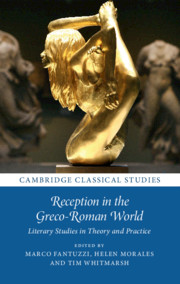Book contents
- Reception in the Greco-Roman World
- Cambridge Classical Studies
- Reception in the Greco-Roman World
- Copyright page
- Dedication
- Contents
- Figures
- Notes on Contributors
- Acknowledgements
- Abbreviations
- Altered States: Cultural Pluralism and Psychosis in Ancient Literary Receptions
- Part I Archaic and Classical Poetics
- Part II Classical Philosophy and Rhetoric, and Their Reception
- Chapter 5 On Coming after Socrates
- Chapter 6 Chimeras of Classicism in Dionysius of Halicarnassus’ Reception of the Athenian Funeral Orations
- Chapter 7 ‘Our Mind Went to the Platonic Charmides’: The Reception of Plato’s Charmides in Wilde, Cavafy, and Plutarch
- Chapter 8 Naked Apes, Featherless Chickens, and Talking Pigs: Adventures in the Platonic History of Body-hair and Other Human Attributes
- Part III Hellenistic and Roman Poetics
- Part IV Multimedia and Intercultural Receptions in the Second Sophistic and Beyond
- References
- Index
Chapter 6 - Chimeras of Classicism in Dionysius of Halicarnassus’ Reception of the Athenian Funeral Orations
from Part II - Classical Philosophy and Rhetoric, and Their Reception
Published online by Cambridge University Press: 05 June 2021
- Reception in the Greco-Roman World
- Cambridge Classical Studies
- Reception in the Greco-Roman World
- Copyright page
- Dedication
- Contents
- Figures
- Notes on Contributors
- Acknowledgements
- Abbreviations
- Altered States: Cultural Pluralism and Psychosis in Ancient Literary Receptions
- Part I Archaic and Classical Poetics
- Part II Classical Philosophy and Rhetoric, and Their Reception
- Chapter 5 On Coming after Socrates
- Chapter 6 Chimeras of Classicism in Dionysius of Halicarnassus’ Reception of the Athenian Funeral Orations
- Chapter 7 ‘Our Mind Went to the Platonic Charmides’: The Reception of Plato’s Charmides in Wilde, Cavafy, and Plutarch
- Chapter 8 Naked Apes, Featherless Chickens, and Talking Pigs: Adventures in the Platonic History of Body-hair and Other Human Attributes
- Part III Hellenistic and Roman Poetics
- Part IV Multimedia and Intercultural Receptions in the Second Sophistic and Beyond
- References
- Index
Summary
Dionysius of Halicarnassus discusses the Athenian funeral orations in his Antiquitates Romanae and his literary-critical essays. He takes a negative view of both the Athenian public funeral and of three specific examples of funeral orations –the Periclean epitaphios in Thucydides, Socrates’ speech in Plato’s Menexenus, and the funeral oration ascribed to Demosthenes (Dem. 60). The nature of his negative pronouncements suggests that his moral aversion to the orations, and to what the public funerals had represented, guided his aesthetic responses to the individual texts. While the encomiastic commonplaces on view in the funeral orations provide the blueprint for Dionysius’ idealised conception of Athens, the speeches themselves are vehicles unworthy of conveying those ideals. The case of the funeral oration offers a good illustration of how Dionysius’ classicism is inherently, recursively nostalgic and so ultimately chimerical. His idealised view of Athens is defined not by the funeral orations themselves, but by the valorisation of authors who made a project of berating their compatriots for failure to live up to the example, and exempla, of earlier generations.
Keywords
- Type
- Chapter
- Information
- Reception in the Greco-Roman WorldLiterary Studies in Theory and Practice, pp. 145 - 166Publisher: Cambridge University PressPrint publication year: 2021

